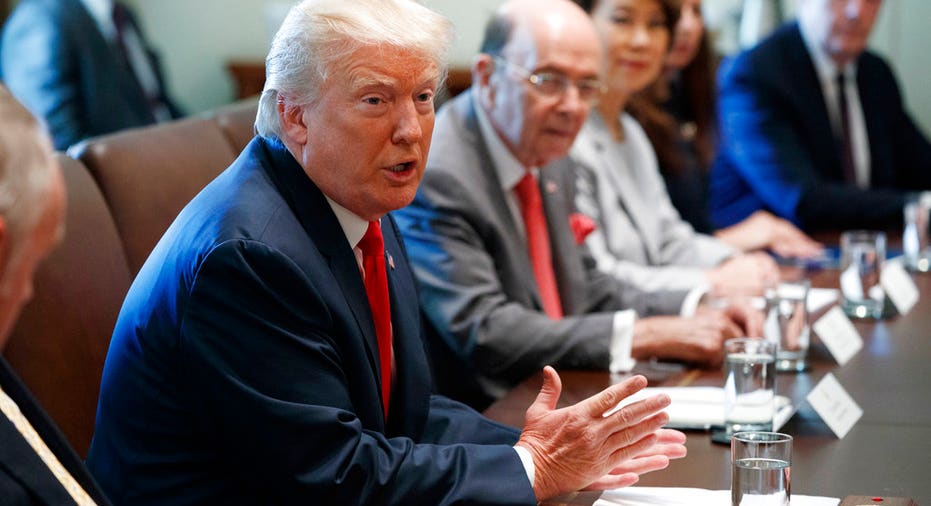White House tax plan gets support from another key outside group

President Donald Trump’s legislative agenda may have stalled after the Senate failed to pass an ObamaCare replacement bill, but that doesn’t mean he’s lost allies outside the White House who are determined to promote the administration’s next major legislative challenge in tax reform.
Matt Schlapp, chairman of the American Conservative Union (ACU), told FOX Business in an exclusive interview, that his organization will be hitting the road from the August recess through the end of the year to help promote the president’s lawmaking priorities, including tax reform and health care.
“We’re going to schedule events and we will be talking about tax reform, but we aren’t moving on from health care. They’ve been promising it for seven years and they need to get it done,” Schlapp said.
The ACU is known for being a voice for conservatives principles and grassroots activists, which is evident when they host the annual Conservative Political Action Conference (CPAC).
The White House is looking to cut the corporate tax rate to 15% from the current 35%, eliminate the estate tax, also known as the “death tax,” close loopholes for state and local deductions as well as simplify the overall tax code.
A White House spokeswoman did not return calls for comment.
Schlapp’s organization joins a bevy of other groups, including lobbyists and think tanks that are moving ahead with their own methods of promoting the president’s tax plan, and to pressure lawmakers into making changes to the tax code and health care system.
In a recent interview, Grover Norquist, founder of the Americans for Tax Reform political advocacy group, told FOX Business his organization plans to meet with senators and other state representatives throughout the August recess to get their pulse on where they stand on tax reform and, for those who are still on the fence, try to push them in the right direction.
“We have had several meetings so far. We are pushing tax reform to the states. We are focused on the states that might need additional encouragement,” Norquist said.
The Business Roundtable (BRT), a lobbying group representing CEOs of some of the largest companies in the United States, is also stepping up to the plate to sell the Republican tax reform plan as they embark on a multimillion dollar national TV and radio ad campaign starting Friday.
According to a BRT press release, “Business Roundtable CEOs, who collectively employee nearly 15 million people and generate more than $400 billion in revenues for small and medium-sized businesses, will make the case for tax reform by showcasing local business voices in communities and local economies across the country.”
Joshua Bolten, president and CEO of the Business Roundtable, also noted in the release that members of congress should expect to hear from business leaders about the need to move on reforming the tax code.
“Tax reform is the single best way to increase investment in U.S. communities, create good jobs and promote a stronger economy. The time for real reform is now,” Bolten said.
Even with this immense amount of outside support, reforming the tax code by the end of the year, including cutting corporate and individual rates, remains an uphill battle as other key legislative items have yet to be determined and must get passed before moving on to new tax reform legislation.
On Tuesday, Treasury Secretary Steven Mnuchin met with Senate Majority Leader Mitch McConnell, R-Ky., and Senate Minority Leader Chuck Schumer, D-N.Y., to discuss where both sides stood on raising the debt ceiling. The meeting ended without a consensus on how the Senate would move forward, with both sides deciding to wait until after the August recess to make a decision.
McConnell on Tuesday said at his weekly press conference that he had a good meeting with both the treasury secretary and Senate minority leader, and they’ll continue to look for a way forward on finding a solution.
Still, the Treasury has warned congress in the past that if they don’t find a way to raise the debt ceiling by Sept. 29, the government won’t be able to pay its bills, leading to a global financial crisis, a stock market crash and a potential economic recession.
The budget is another potential hurdle for passing any form of tax legislation by the end of year.
Democrats and Republicans in both chambers of congress failed to come to a consensus on how to move ahead with crafting a new budget in advance of their congressional holiday and, based on the House legislative calendar, will have only 12 days to work out a deal when they come back from their break before the government shuts down.



















